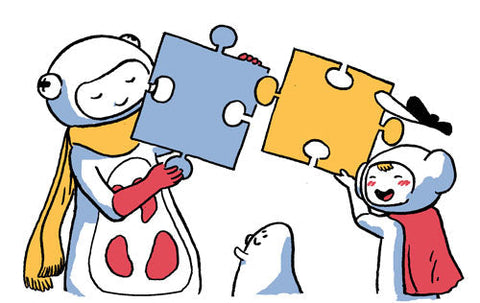Being a leader ain’t always easy.
It’s a funny old thing - you get really good at your job, and then you get promoted to a leadership role that requires you to do very little of that job any more.
It's a unique challenge that people face later in their career, and - usually - only once. The transition can be a tricky one! But research shows that there is a 'secret sauce' that helps some leaders really excel.
That secret sauce is emotional intelligence.
What is emotional intelligence in leadership?
Emotional intelligence is pretty well known as a concept now: it’s the ability to recognise and manage your own emotions, as well as the ability to understand and respond appropriately to the emotions of others. So how does that translate into a leadership skill?
There’s no denying that some of the biggest topics in the world of work have had strong emotional themes in recent years. The uncertainty of the pandemic, the joy that has come from finding better work-life balance. These macro themes help set the scene, but when you consider the key day-to-day elements of employment, it becomes even more clear why the ability to navigate emotions is a great trait for leaders to have.
Just think about the level of emotion experienced during the following processes - and the fallout if the leaders involved handle things insensitively:
- Recruitment (anxiety, excitement)
- Onboarding (anxiety, anticipation, excitement)
- Performance issues (anxiety, guilt, shame, sadness)
- Promotions - won or missed out on (competitiveness, pride, disappointment, anger, resentment)
- Personal issues, illnesses, absenteeism (grief, sadness, anxiety, fear, isolation)
- Celebrations - people share news of engagements, marriages, pregnancies, new homes, holidays, birthdays and other milestones with their colleagues (joy, excitement, happiness, jealousy)
And we all experience generic emotional highs and lows on a monthly, weekly and even daily basis.
What is the value of emotional intelligence in leadership?
It’s clear that working is an undeniably emotional experience! And of course it is - so much rides on our ability to work and provide for ourselves.
An emotionally intelligent leader can see all those stories playing out, empathise with the people experiencing them and respond sensitively and appropriately to them. Leaders that don’t acknowledge or allow for everyday emotions create unnecessary friction.
But emotionally intelligent leaders are more than just good for morale. They are good for the bottom line, too. Yes, research has shown time and time again that emotional intelligence at work is what sets great leaders apart from their peers.
- In 2016, the World Economic Forum predicted that emotional intelligence would be one of the top ten skills required by 2020.
- Psychologist Daniel Goleman studied 200 workplaces and found that without emotional intelligence, you'll struggle to be a great leader (but don't worry, you can develop it!).
- In the book EI 2.0, Dr Bradberry and Dr Greaves show that people with average IQs outperform those with high IQs 70% of the time. They went on to found TalentSmart; its research showed that emotional intelligence is such a strong predictor of performance that it explains 58% of success in all types of job when compared with 33 other skills (including decision making, communication and accountability).
Eight ways to increase your own emotional intelligence at work
There are tonnes of practices that can help you bring emotional intelligence to the workplace - and the good news is that unlike IQ, you can improve your EQ over time! Here are some ways to start to cultivate a higher emotional intelligence.
- Mindfulness; in general, but also with a focus on empathy
- Daily journaling about your own emotions
- Practice storytelling (and story listening) - it harnesses the power of emotions
- Learn to notice, name and accept your own emotions
- Practice gratitude each day - even just noting down three things you’re grateful for before you go to bed can be a powerful practice
- Learn about your stressors - what grinds you down or makes you feel overwhelmed, and what are the early signs of this? And what helps you to recover?
- Undertake relevant training, such as a course in resilience or active listening
- Train to become a mentor, and find a mentor for yourself
All of the activities help you to get in touch with your own emotions, or to empathise with others, which in turn will help you notice and respond empathically as emotions arise in future. This advanced ‘noticing’ will also allow you to predict the emotional outcomes of decisions before you make them, so that you can prepare in advance.
Promote company-wide emotional intelligence at work
You can start to introduce these concepts at your workplace too - that’s the great thing about being a leader! Even seemingly small changes, like fun ice-breaker activities that help people notice and discuss emotions during regular meetings, can start to create widespread change.
For example, try Happy Story, Angry Face (number four on this list of icebreakers) to see how hard it is to tell an emotive story while acting out a different emotion, or use the Icebreaker Stories tactic to get people emoting about the strangest things.
Or, kick-start the process of encouraging people to identify their own stressors, early warning signs that they are emotionally off-balance and to build the tools to help them get back on track. Introduce resilience training, mentorship opportunities and mindfulness sessions. There's so much you can do to create a strong pipeline of emotionally intelligent future leaders.
If you find that you struggle to connect with people emotionally, don’t worry. It’s not uncommon! If it’s a skill you’d like to develop, talking therapy can help you get to the bottom of why you find it difficult. And the practices above have many benefits for you personally, as well as the people you are leading!









